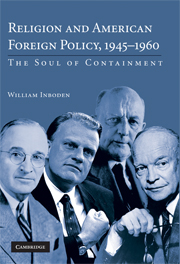1 - Hopes Deferred: Protestants and Foreign Policy, 1945–1952
Published online by Cambridge University Press: 31 July 2009
Summary
The approaching end of World War II brought to the American people a sense of relief, joy, and anticipation. For America's Protestant leadership, the end of the war also brought a dilemma. The international system lay in chaos and urgent need of repair. Meanwhile, Protestantism stood at its zenith of cultural influence in American life. But translating that cultural hegemony into concrete action posed a considerable challenge. Moreover, Protestantism's predominance in shaping American values only lightly glossed over serious internal differences wracking the churches. The dilemma confronting Protestant leaders was twofold. How could they channel their cultural influence into specific policy initiatives? And how could they resolve their own growing differences over the nature of God, man, and America's place in the world?
Ultimately, they failed at both tasks. Despite concerted efforts over the next fifteen years, the mainline Protestant churches were unable to shape decisively American foreign policy or the international order. Furthermore, the theological divisions simmering in 1945 soon developed into massive rifts, further fracturing American Protestantism into diffuse voices and diluted influence.
Failures often reveal as much as successes, however. The story of the mainline leadership's inability to implement a common foreign policy vision in turn points to the triumph of an alternative diplomatic theology developed by America's political leadership. This public theology, which strongly influenced the strategic doctrine of containment, drew on many resources in the American Protestant tradition.
- Type
- Chapter
- Information
- Religion and American Foreign Policy, 1945–1960The Soul of Containment, pp. 29 - 62Publisher: Cambridge University PressPrint publication year: 2008



